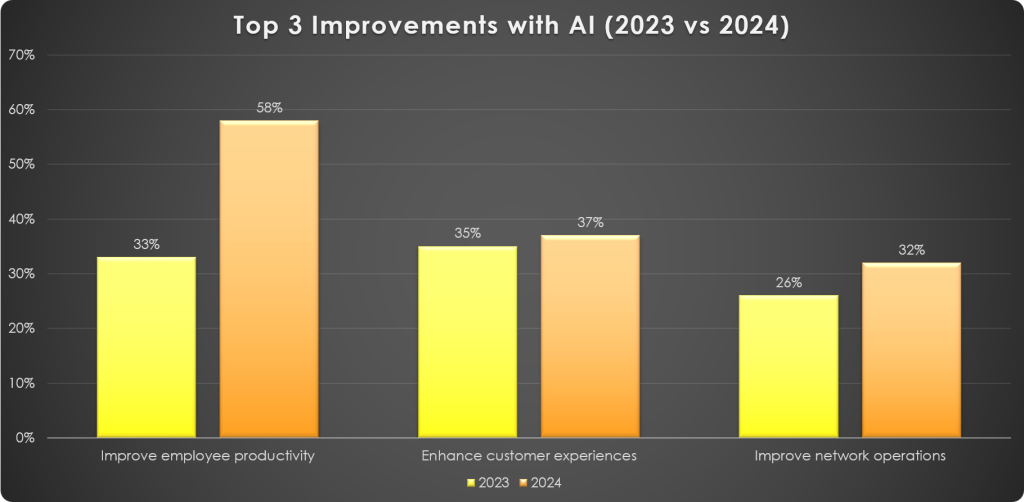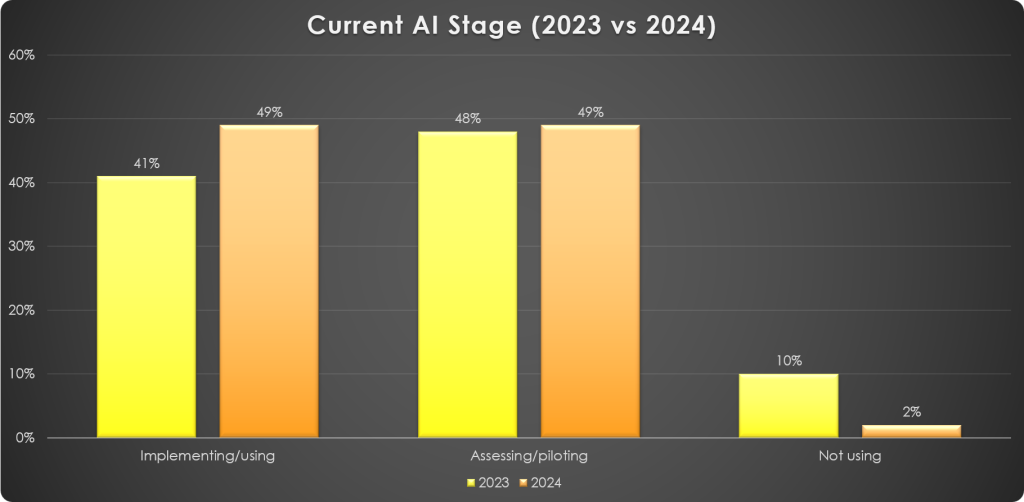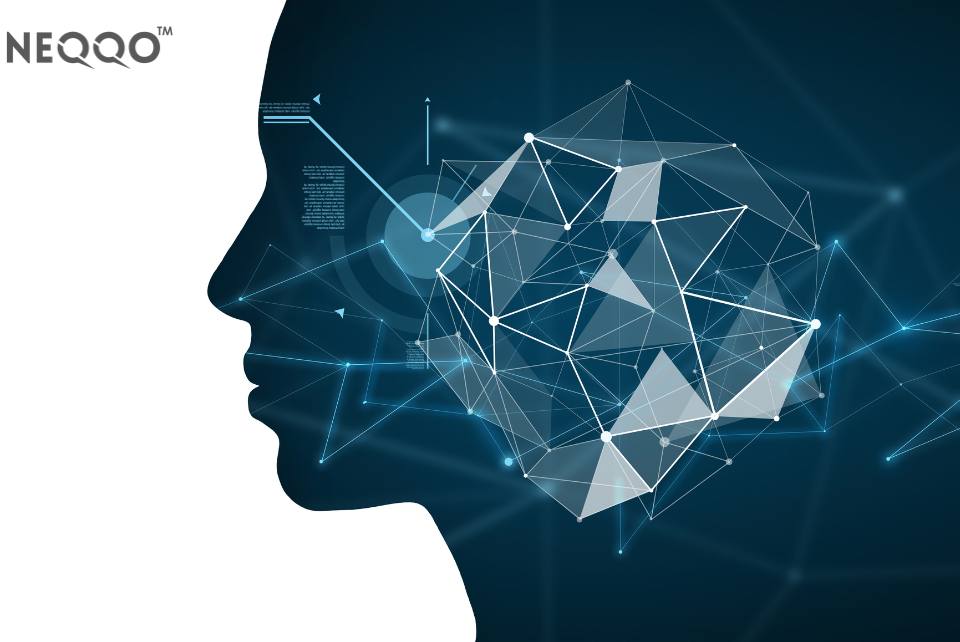In the fast-paced business world, with the skyrocketing customer expectation, organizations are always pressurized to provide outstanding services. Therefore, it is critical for the organizations to meet such expectations. For the telecommunications industries, such challenges are dealt by the frontliners, i.e., the agents. Moreover, telecom organizations offer several services; however, the spotlight lies on the heart of customer interactions, i.e., the contact center agents. The rapid rate at which the business world is growing, traditional methods are no longer sufficient to train the agents for today’s high stakes.
That’s where AI-Powered Agent Coaching in Telecom comes into play, an innovative method that implies AI-driven insights to improve engagement and performance of the agents. With cutting-edge technology, this is the next-generation training approach to transform the operations of telecom organizations and develop their customer support teams.
1. Traditional Agent Coaching Is Not Enough
Telecom industries handle thousands of complex queries on a regular basis, including technical difficulties and billing issues. The traditional approach focuses on handling the customers manually.
However, there are numerous limitations in following the traditional approach which are as follows:
- It’s time-consuming and subjective;
- It reviews only a small percentage of calls;
- It lacks personalization;
- It’s reactive rather than proactive.
In the telecom industry, where every second counts and every interaction can impact customer retention, telecom companies need a data-driven solution, and that’s exactly what AI-powered agent coaching delivers.
65% of respondents say they’re planning to increase their AI infrastructure budget in 2025.
43% of respondents say the need for AI experts has been the key obstacle to AI adoption at scale in telecommunications.
2. What is Agent Coaching 2.0?
This approach is an enhanced version of traditional coaching methods that is backed by advanced technologies like Natural Language Processing (NLP), data analytics, and machine learning (ML). Moreover, it defies the dependency on human evaluations as it implements innovative automation to evaluate all interactions conducted through calls, mails, or chats, and generate real-time feedback.
This intelligent coaching model identifies performance gaps, measures behavioral trends, and provides tailored learning paths for each agent. This leads to a more engaged workforce, higher employee performance, and better customer satisfaction scores.
3. Getting Started with Agent Coaching 2.0
In a nutshell, Agent Coaching 2.0 means training the agents with the use of technology. It is essential for the telecom organizations to implement this approach effectively by following below mentioned steps:
- Define KPIs: Clearly outline success metrics for coaching (e.g., FCR, CSAT, AHT).
- Choosing the Right Technology: For the telecom industry, technology holds an essential place in managing the operations. It is crucial to invest in advanced AI technologies for handling the CRM and workforce management systems and customer satisfaction.
- Train Your Coaches: Equip supervisors with the skills to interpret AI insights and humanize the coaching experience.
- Promote Agent Buy-In: Involve agents in the process, demonstrate benefits, and create a culture of continuous improvement.

4. How AI-Driven Insights Are Revolutionizing Telecom Coaching
A. Real-Time Feedback for Immediate Impact: One of the most powerful applications of AI in telecommunication coaching is the ability to provide real-time feedback during live customer interactions. AI tools analyze speech patterns, tone, sentiment, and script adherence to let the agents adjust their approach quickly. Such capabilities allow the agents to resolve the queries quickly and enhance customer satisfaction.
For example, if a customer gets frustrated, the AI can notify the agent to talk accordingly and display empathy.
B. 100% Interaction Monitoring with Speech Analytics: The days of randomly selecting calls or interactions are gone. AI-driven coaching can monitor and evaluate every customer interaction. This is especially critical in telecom, where regulatory compliance and service consistency are non-negotiable.
With speech and text analytics, AI evaluates calls for language, sentiment, quiet time, interruptions, and keywords to provide exceptional insights. This allows the supervisors to identify both brilliant and underperforming agents with complete accuracy.
C. Personalized Coaching Paths: Every agent has their own unique strengths and challenges. With AI-powered agent coaching, telecom companies can deliver personalized development plans based on the individual’s performance. Whether an agent struggles with technical issue resolution or upselling, the system recommends targeted micro-learning modules or live coaching sessions.
This level of personalization increases agent engagement by making learning relevant and actionable which is a major step forward from the “one-size-fits-all” training approach.

5. Key Benefits of AI-Driven Agent Coaching
- Enhanced Call Quality: With AI, real-time evaluations become easy to promote improved quality interactions.
- Higher Agent Retention: Personalized development and recognition reduce attrition, improving agent retention.
- Improved Compliance: Automated monitoring flags potential compliance violations instantly.
- Quick Onboarding: New hires ramp up faster with guided, AI-powered training.
- Scalability: Easily manage coaching across hundreds or thousands of agents with AI support.
97% of telcos are adopting AI. Nearly half are already deploying it.
6. The Technology behind Agent Coaching 2.0
Here are the core technologies fueling this transformation in telecom coaching:
- NLP: Understands language structure, sentiment, and intent across voice and text interactions.
- Machine Learning: Learns from vast datasets to continuously improve feedback accuracy and coaching recommendations.
- Analytics: Predictive analytics can forecasts trends and identifies potential risks in agent performance or engagement. This also includes capturing verbal cues, voice modulation, and silence for understanding the agent behavior.
- Automation Tools: Schedule coaching sessions, assign training modules, and alert supervisors automatically based on performance triggers.
Conclusion: A Smarter Way to Coach in Telecom
Agent coaching 2.0 is a paradigm shift towards how telecom organizations operate. It is not just an upgrade but a way to enhance agent performance and engagement, ultimately improving the customer experience. With the implementation of AI-driven insights, telecom organizations can provide personalized and real-time coaching to empower agent’s performance and enhance customer satisfaction.
With agent coaching 2.0 backed with advanced technology, telecom organizations can meet the changing customer expectations and agents’ performance.


